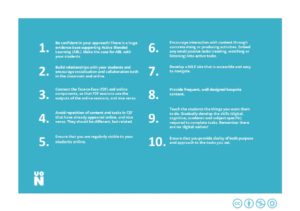“I didn’t realise this was stuff that could actually help us… with actually learning”: Student perceptions & experiences of Active Blended Learning [ABL]
Authors: Elizabeth Palmer, (University of Northampton, Learning Designer,) Sylvie Lomer, (University of Manchester, Lecturer in Education) and Ivelina Bashliyska (3rd Year Undergraduate Student and Assistant Researcher).
With thanks to Nadine Shambrooke and David Cousens for support with transcription and coding.
______________________________________________________________________
The University of Northampton has taken an institutional approach to learning and teaching through the widespread adoption of Active Blended Learning (ABL) as its new ‘normal’. To find out more please visit: https://www.northampton.ac.uk/ilt/current-projects/waterside-readiness/
However, student engagement has been highly variable, which has created a number of challenges for staff. Semi-structured qualitative focus groups have been undertaken with 201 undergraduate students across all the year groups and faculties during the academic year 16/17 based on a pilot study of 24 students in academic year 15/16. These focus groups have been looking at trying to uncover the students own perceptions and experiences of ABL in order to unpick the reasons behind varying patterns and engagements and to glean student insight into the factors that inhibit or encourage engagement with ABL.
The study has revealed a number of key factors which students identify as having significant impact on their engagement. Key success factors include effective pedagogical design, in particular establishing a clear and explicit relationship between online and face to face components of modules, and scaffolding the development of digital skills and literacies in the process of establishing online tasks. A strong relationship between staff and students is also critical, where students trust in the decisions and motivations of staff. This is signalled by following up on online tasks, providing feedback where relevant, and explicitly discussing the value of online tasks to module learning outcomes and employability skills. A key finding is that students’ conceptions of learning, teaching & knowledge impact on their engagement with ABL, and are not necessarily compatible with ABL principles. These factors are complex, interdependent and have varying loci of control. Staff can take a number of measures to increase the likelihood of student engagement, although certain factors remain ultimately within the agency of students. Understanding these issues is critical to the success of ABL.
The following artefacts provide the results of the study to date:
Read the Interim Report from the Main Study here:
For Ten Top Tips on how to design ABL to maximise student engagement:
Read the Pilot Study Report here:
Recent Posts
- H5P (HTML5 package) content types meets the needs of Jim Atkinson, Staff Development Trainer
- Blackboard Upgrade – July 2025
- StudySmart 2 – Student Posters
- NILE Ultra Course Award Winners 2025
- Blackboard Upgrade – June 2025
- Learning Technology / NILE Community Group
- Blackboard Upgrade – May 2025
- Blackboard Upgrade – April 2025
- NILE Ultra Course Awards 2025 – Nominations are open!
- Blackboard Upgrade – March 2025
Tags
ABL Practitioner Stories Academic Skills Accessibility Active Blended Learning (ABL) ADE AI Artificial Intelligence Assessment Design Assessment Tools Blackboard Blackboard Learn Blackboard Upgrade Blended Learning Blogs CAIeRO Collaborate Collaboration Distance Learning Feedback FHES Flipped Learning iNorthampton iPad Kaltura Learner Experience MALT Mobile Newsletter NILE NILE Ultra Outside the box Panopto Presentations Quality Reflection SHED Submitting and Grading Electronically (SaGE) Turnitin Ultra Ultra Upgrade Update Updates Video Waterside XerteArchives
Site Admin





